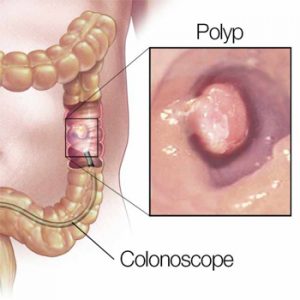What is preventive colonoscopy?
Preventive screening with colonoscopy is the solution for combating colon cancer.

In addition to skin cancer, colon cancer is the third most commonly diagnosed cancer in the United States and will cause nearly 50,000 deaths in 2018, according to the American Cancer Society. However, prevention is highly possible when we combine appropriate screening, healthy lifestyle changes, and increased awareness.
Q. What is colon cancer?
A. Colon cancer is a term used for cancer that affects the lower part of the digestive system and rectal cancer, which occurs in the last centimeters of the colon.
Q. How does colorectal cancer begin?
A. More often than not, colon cancer begins with precancerous polyps on the surface of the colon. These precancerous cells can form as lumps, be flat, or be embedded in the walls of the intestine. Finding and removing polyps helps prevent colon cancer.
Q. Who is at increased risk?
A. Several factors put individuals at higher risk for colon cancer:
Age. Most people diagnosed with colon cancer are over 50 years old. However, it also affects younger individuals, albeit much less frequently. A recent study suggests a slight increase (about 2%) in colon cancer among adults in the U.S. under the age of 40.
Personal and family history. A previous history of colon cancer, polyps, or a family history of the disease increases the risk of colon cancer.
Intestinal conditions. Pre-existing inflammatory bowel diseases such as ulcerative colitis and Crohn’s disease increase the likelihood of developing colon cancer.
Health problems and unhealthy lifestyle. Health conditions such as diabetes and obesity, and unhealthy lifestyle factors like lack of exercise, high-fat diet, smoking, and alcohol consumption contribute to colon cancer.
Q. How is colon cancer prevented?
Screening for colon cancer is vital for prevention and early detection. Colonoscopy is considered the most appropriate screening with multiple benefits. Experts recommend starting screening for colon cancer at age 50 or 10 years earlier than the age at which a direct family member was diagnosed. For example, if your mother was diagnosed at age 48, you should have your first screening at age 38.
In addition to screening, improvements in a healthy lifestyle can help prevent colon cancer. Exercise on most days of the week and a diet rich in fruits, vegetables, and whole grains. Quit smoking, maintain a healthy weight, and drink alcohol in moderation, or not at all.
Q. What are the symptoms?
Symptoms are usually mild or not noticeable during the early stages of colon cancer, which is why regular screening is essential. If signs do appear, they typically manifest as:
- Blood in stools or rectal bleeding
- Unexplained weight loss
- Persistent abdominal issues, such as cramps, bloating, and pain
- Changes in bowel habits, including diarrhea, constipation, or stool consistency
- Fatigue and/or weakness
Colon cancer can be prevented with preventive screening through colonoscopy combined with healthy lifestyle changes and increased awareness.
Discuss with your doctor if you have questions or concerns regarding colon health. And be sure to encourage friends and loved ones to follow screening guidelines.
Why should I have a preventive colonoscopy?
Colonoscopy is a procedure performed by a gastroenterologist during which the colon is examined for polyps. Polyps are abnormal growths that can be found on the inner lining of the colon.
They can vary in size, number, and location within the colon. Although most colon polyps are benign, some have the potential to develop into cancer if they remain in the colon. Because of this, your gastroenterologist will usually remove any polyps found during the colonoscopy. By detecting and removing polyps, colonoscopy reduces the risk of developing colon cancer.


